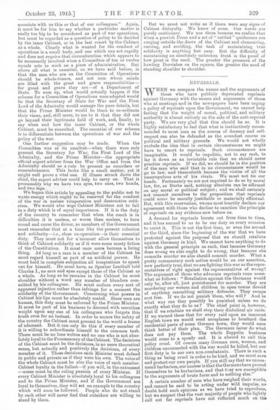REPRISALS.
HEN we compare the names and the arguments of those who have publicly deprecated reprisals against Germany with the names and arguments of those who at meetings and in the newspapers have been urging a policy of reprisals upon the Government, we cannot help feeling that the weight of moral, political, and military authority is almost entirely on the side of the anti-reprisal party. We are very glad that this should be so. It is highly satisfactory to feel that what is instinctively recom- mended to most men as the course of decency and self- respect can also be defended as the soundest course on political and military grounds. We would not wholly exclude the idea. that in certain circumstances we might have to resort to reprisals. Such circumstances are imaginable. It would be impolitic, not to say rash, to lay it down as an inviolable rule that we should never practise reprisals. If we did, we should be in the position of the man who said that in no circumstances would he go to law, and thenceforth became the victim of all the unscrupulous arts of his rivals. We must not tie our hands. Fortunately we are not required to do so by moral law, for, as Burke said, nothing absolute can be affirmed on any moral or political subject ; and we shall certainly not commit ourselves to the proposition that reprisals could never be morally justifiable or materially effectual. But, with this reservation, we can most heartily declare our agreement with those who decline to sanction the principle of reprisals on any evidence now before us.
A demand for reprisals bursts out from time to time, and it has seemed to us to be our duty on every occasion to resist it. This is not the first time, or even the second or the third, since the beginning of the war that we have protested against the proposal that we should retaliate against Germany in kind. We cannot have anything to do with the general principle as such, that because Germany does wrong we also ought to do wrong, that because she commits murder we also should commit murder. What a pretty commentary such action would be on our assertion, now perfectly true, that we are fighting this war as the repre- sentatives of right against the representatives of wrong! The argument of those who advocate reprisals runs some- what as follows : " Retaliation against the Germans would only be, after all, just punishment for murder. They are murdering our women and children in open towns devoid of anything resembling military defences. They escape scot free. If we do not punish them, who will? Aud in what way can they possibly be punished unless we do exactly what they do to us ? The chief point is, however, that if we retaliate we shall stop their diabolical air raids. If we warned them that for every raid upon an innocent English town we would send aeroplanes to bombard the residential parts of some German town, they would soon think better of their plan. The Germans never do what does not pay them. The whole Zeppelin business would come to a speedy end. It is absurd to call this policy cruel. Of course many German men, women, and children unconnected with the war would be killed, but our first duty is to our own non-combatants. There is such a thing as being cruel in order to be kind, and we must save and protect our own people. If you still say that we recom- mend barbarism, our answer is that the Germans have proved themselves to be barbarians, and that tiley are susceptible to the arguments of brute force and to nothing else." A certain number of men who have weighed their words, and cannot be said to be acting under wild impulse, no doubt hold such opinions as we have tried to reproduce, but we suspect that the vast majority of people who lightly call out for reprisals have not reflected much on the subject, and are quite unaware of what past experience has warned us may be the results of a policy of reprisals. Even agaiust barbarians reprisals have often done far more harm than good. A savage tribe, no admit, respond sometimes to the sharp lesson of a reprisal, when their brain is impenetrable by any other form of argument ; but there aro, even on the most favourable ground for reprisals, many examples to the contrary. In the earlier stages of the Indian Mutiny it was widely believed that atrocity could be met only by atrocity. Excellent men accepted that view. .But all learned to admit that the plan was a total failure. The mutineers hardened in their brutality and their resent- ment, and meanwhile the injury done to our repute and prestige—the only qualities by which we hold India—was great. Two wrongs do not make a right, and the nation which argues as though they did adds nothing to its equipment for successfully waging war. Law- breakers who are men of spirit simply become worse law-breakers than ever when they observe that their opponents have also begun to break the law. When a competition in law-breaking sets in the victory in that particular kind of warfare will infallibly go to the side which is less troubled by scruples. Is it pre- tended that Britain would beat Germany in such a competition? A. point would sooner or later be reached which wo could not bring ourselves to pass. The point where Germany would draw the lice would no doubt lie a good deal further along the road of degradation. We should then be in the same relation to Germany in which we stand now, except that in the meantime a hideous amount of suffering would have been inflicted on innocent persons, and that we should to the extent of our commissions have lost our character. Are the supporters of reprisals prepared to go to the logical extremity of their principles ? Do they understand what they are asking ? Take a simple and very obvious illustration. The Germans lately executed Miss Cavell, a good and brave English hospital nurse, on a charge of harbouring fugitives. Are Englishmen prepared for such reprisals as this execution suggests ? "If you kill our women and children by bombs from aeroplanes," the Germans might say, " we shall kill a corresponding number of Englishwomen who are in our hands. Our execution of Miss Cavell shows that we shall not stick at killing your women." The logical answer of the British supporter of reprisals would have to be : " Then we shall also kill your women who are interned in Britain." But is there a single English- man, no matter how many public meetings he has attended in support of reprisals, and no matter how many letters ho has written to the papers demonstrating the infallible success that would attend reprisals, who is willing to make that horrible and criminal retort ? We cannot believe that there is one. Press the policy of reprisals to its extreme and it becomes unworkable, because it is too awful to be contemplated. In what we have written we have confined ourselves to the question of reprisals as generally understood and as at present proposed. We do not, for example, call the use of gas a reprisal in the popular sense in which we have used the word. There is no greater objection to gas in itself than to shells. One is not necessarily more inhumane than the other. At the Hague discussions both the British and A morican representatives did not wish to prohibit the use of gas. Germany did wish to prohibit it. In the end we yielded to German wishes, and we naturally abided by our pledge till Germany by breaking hers released us from any further obligation in the matter. To sum up, while wo cannot lay it down as a rule of universal and invariable application that reprisals must be wrong, we can and do protest against the reasons which are now given for reprisals, and against the spirit in which they are advocated. The outcome of our experiment in giving special treatment to German submarine prisoners warned us of what we must expect if wo enter into a competition with an unscrupulous country. The principle " I shall act brutally because you do" is bound to fail, and would do us immeasurable harm in character as well as in substance. Every proposal for retaliation must, in short, be judged by the spirit, or the ethics, which inspires it. And we do not hesitate to say that the spirit of every pro- posal which has yet been laid before us is fundamentally 'wrong,







































 Previous page
Previous page